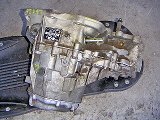 | 11.02.2006
Transmission
The replacement transmission came from a 1999 9-3. It's an FM55 505 model,
while the original gearbox on the car was FM55 501.
| 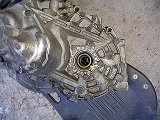 | 11.02.2006
Left side
The new gearbox came from a scrap yard, so it's a good idea to replace
both differential seals.
|
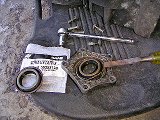 | 11.02.2006
Seals
Pry the new seal out using a big screwdriver or a chisel. It's not
necessary to remove the entire cover, but I find it easier than doing
it right on the gearbox.
| 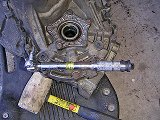 | 11.02.2006
Cover in
Carefully push the new seal in, use a rubber mallet if needed. Install
the cover back on and tighten the bolts to 16 ft-lbs with a Torx T40 socket.
|
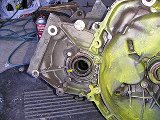 | 11.02.2006
Right side
Do the same on the right side of the differential.
| 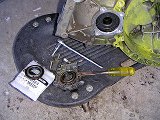 | 11.02.2006
Seals
The bag shows a GM part number (useful if your dealer uses those, like
they do in Canada). The Saab part is #8749046.
|
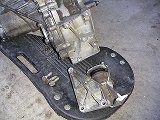 | 11.02.2006
Rear mount
Attach the rear engine mount (30 ft-lbs, 16 mm socket). For a
later transmission model, the mount bracket might be different -- check the
compatibility if you're upgrading to a newer gearbox.
| 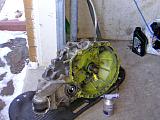 | 11.02.2006
Pipe
Time to bleed the slave cylinder. Push the throwout bearing in slowly to
compress the piston inside it. When you let go, the bearing will spring
back out, but the piston will remain compressed.
|
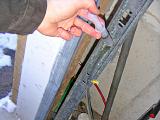 | 11.02.2006
Brake fluid
Attach a 40..50 cm piece of clear tubing to nipple on top of the slave
cylinder. Fill the tube with brake fluid to ¾ of its height.
| 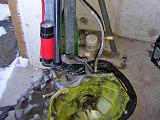 | 11.02.2006
Pressure
Pump some air into the tube. The slave cylinder will expand, and you will
see the fluid level dropping. When the cylinder maxes out, the fluid will
stop and the pressure will go up. Release the pressure and compress
the slave again. You might see small air bubbles coming out.
|
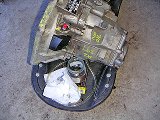 | 11.02.2006
Bleeding finished
Repeat the process several times, add more brake fluid if necessary. When
you don't see the bubbles anymore, detach the hose (careful not to
spill the fluid all over) and plug the nipple.
| 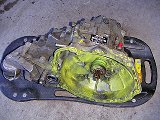 | 11.02.2006
Ready
Lock the transmission in third gear. Make sure you can undo the fill and
drain plugs (but keep them in). Lubricate the shaft splines.
The gearbox is ready for installation.
|
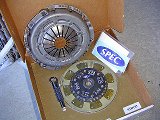 | 11.02.2006
New clutch
I am installing a Viggen pressure plate with a SPEC stage2 kevlar clutch
plate. The clutch conveniently comes with an alignment tool.
| 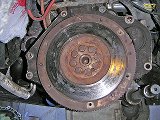 | 11.02.2006
Flywheel
Inspect the flywheel. If it's visibly scratched or scored, or has cracks
on the surface, you need to take it to a machine shop for resurfacing.
Torque the bolts to 59 ft-lbs.
|
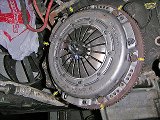 | 11.02.2006
Alignment tool
Install the clutch with the pressure plate and put the bolts in hand-tight.
Insert the alignment tool and make sure the clutch plate it perfectly
centered. Tighten the bolts alternately to 16 ft-lbs (12 mm socket).
| 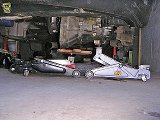 | 11.02.2006
Jacks
A specialized transmission jack or
a shop crane
is preferred, but a pair of
regular hydraulic jacks will do the job. Make sure the transmission is
balanced, roll it under the car and raise to the engine level.
|
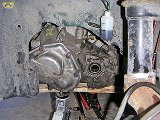 | 11.02.2006
Left side
Push the transmission in. Remember that you have to match the splines on
the clutch plate and the intermediate shaft in the same time. If necessary,
turn the flywheel and/or the driveshaft on the right side. The picture
shows the brake line disconnected, it was a part of
another job.
| 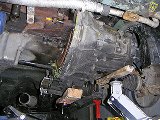 | 11.02.2006
Fitted
The transmission should be perfectly level with the engine in order to go
in. Again, a lower control arm bolt works well as a guiding pin. Once you
close the gap and the intermediate shaft snaps in on the other side,
replace the front bolt with a proper one and tighten it.
|
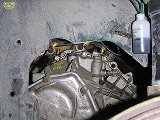 | 11.02.2006
Upper bolts
The three upper bolts are easily accessible from the wheel well, just use a
longer extention. Don't forget the fifth bolt in the rear. The torque for
these is 50 ft-lbs (18 mm socket).
| 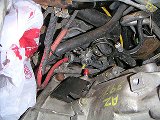 | 11.02.2006
Clutch line
Remove the cap from the slave cylinder nipple and attach the clutch line.
If you have a cable clutch, attach the cable.
|
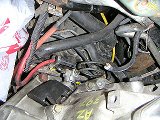 | 11.02.2006
Clutch line
Insert a locking clip to secure the clutch line. The nipple in front will
be used to bleed the clutch once the job is done.
| 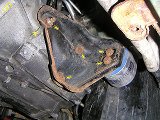 | 11.02.2006
Bracket
Attach the bracket for the transmission mount, as well as the mount
itself (30 ft-lbs, 16 mm socket).
|
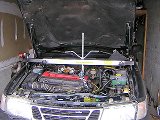 | 11.02.2006
Support beam
Raise the engine until the transmission mount fits its position on the
side member.
| 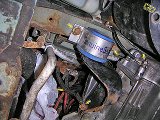 | 11.02.2006
Mount
Tighten the transmission mount bolts to 46 ft-lbs (15 mm socket). Attach
the ground wires to the mount bracket, and to the side of the gearbox
(17 mm and 13 mm sockets).
|
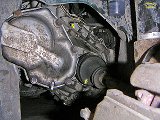 | 11.02.2006
Driveshaft
Insert the driveshaft until the snap ring clicks. Plug in the reverse gear
sensor wire.
| 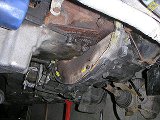 | 11.02.2006
Flywheel cover
Install the flywheel cover (two 11 mm bolts).
|
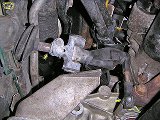 | 11.02.2006
Linkage
Attach the linkage to the gearshift rod on the transmission (13 mm bolt),
connect the arm to the ball pin and insert the shifter rod into its housing.
After the entire installation is finished, the shifter needs to be
aligned.
| 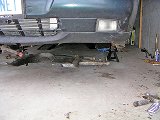 | 11.02.2006
Subframe
Position the subframe for installation.
|
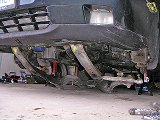 | 11.02.2006
Front bolts
First, raise the front end and screw the bolts in hand-tight.
| 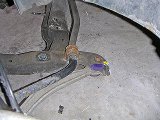 | 11.02.2006
Washers
Place the washers on the stanchion arm attachment points.
|
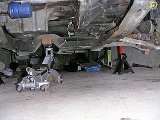 | 11.02.2006
Rear end
Jack up the rear end, insert the remaining bolts and align the subframe
so it matches the position it was in before the removal. Connect the
ball joints and tighten to 55 ft-lbs (18 mm wrench).
| 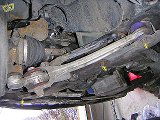 | 11.02.2006
Subframe bolts
Tighten the four corner bolts using a 16 mm socket: front to 85 ft-lbs
and rear to 78 ft-lbs + 90°. Tighten the middle bolts to
141 ft-lbs (18 mm socket). If you had to remove the control arms, they
need a 15 mm socket at 85 ft-lbs.
|
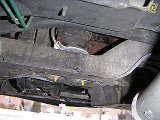 | 11.02.2006
Rear mount
Tighten the nuts on the rear engine mount to 37 ft-lbs (16/17 mm socket).
| 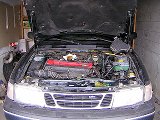 | 11.02.2006
Beam removed
Remove the engine support beam.
|
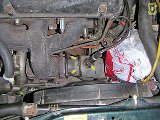 | 11.02.2006
Downpipe
Attach the downpipe to the turbo (three 13 mm nuts at 18.5 ft-lbs).
Install the front O2 sensor (22 mm crowfoot wrench, 41 ft-lbs).
| 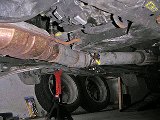 | 11.02.2006
Exhaust
Install the rear O2 sensor (22 mm crowfoot wrench, 41 ft-lbs). Seal the
joint to the flexpipe and tighten the clamp to 15 ft-lbs (13 mm socket).
Install the subframe brace if equipped.
|
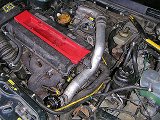 | 11.02.2006
Delivery pipe
Install the delivery pipe and tighten the hose clamps. Attach the hoses
to the bypass valve. Bleed the clutch, shift the transmission to fourth
gear and
align
the shifter linkage.
| 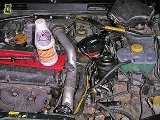 | 11.02.2006
Gearbox oil
Fill the gearbox with oil (flush twice if switching to synthetic).
Install the battery. Attach the lower shields. Fit the wheels (81 ft-lbs)
and lower the car to the ground.
|
|